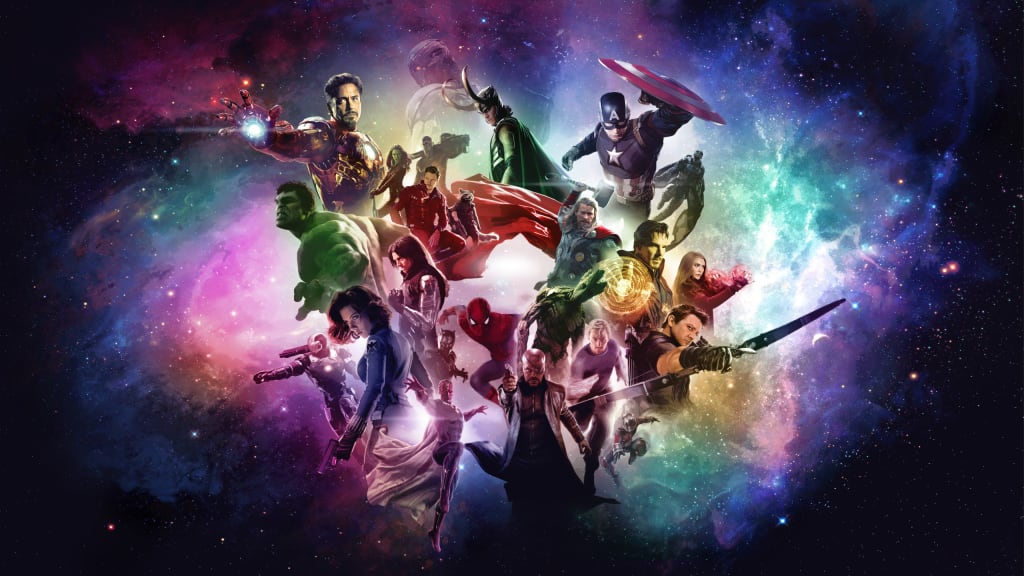
Kicking off in 2008, the Marvel Cinematic Universe has become a unique Hollywood creation. It's not just a shared universe of movies — the #MCU embraces films, TV series, and Netflix shows. What's more, it's supported by a range of tie-in comics, fun one-shots, and even a range of in-universe YouTube videos.
Now, it's worth noting that Spider-Man: Homecoming has introduced some real continuity issues for the MCU. The film is ostensibly set two months after the events of Iron Man, but eight years after the events of The Avengers. Worse still, dialogue in the film tells us that petty thief Aaron Davis is aged 33, and was born in April 1984. That sets the movie's date as 2017. As I've discussed in detail in another post, it's only possible to make continuity work if you make two assumptions:
- Firstly, that any references to the passage of time — such as "eight years later" — are approximate, and can be taken as indicating anywhere between "seven years and nine months" and "eight years and six months."
- Secondly, given this directly contradicts firm dates given in the TV shows, you have to embrace a model that was developed by Star Wars decades ago. Back before the Disney purchase, Lucasfilm worked by 'tiers' of canon. The movies were the top tier of canon; anything else was canon only to the extent that it didn't contradict the movies. Using this principle, then, if a TV show refers to the Chitauri invasion in 2012? It's wrong, because it contradicts Homecoming.
It's entirely possible — and, indeed, probably likely — that Homecoming is in error. Still, until such a time as we get confirmation from the likes of #KevinFeige, here's how the timeline looks...
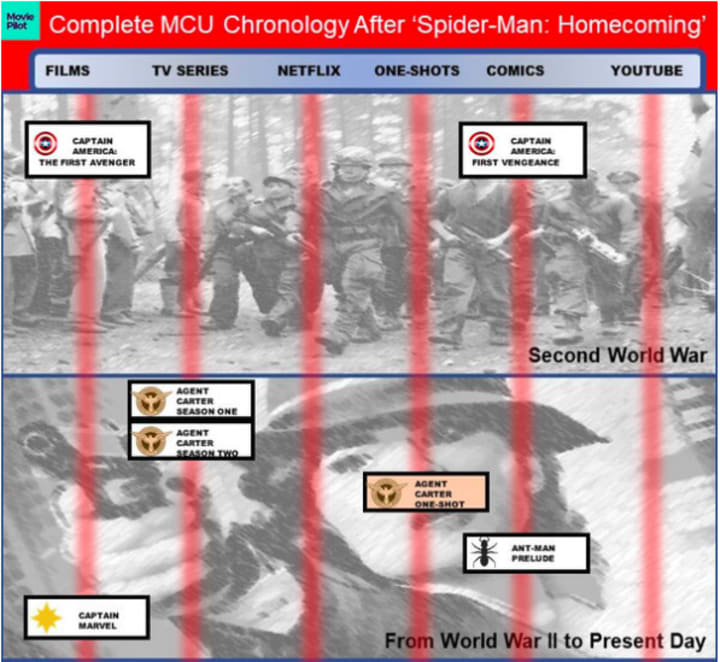
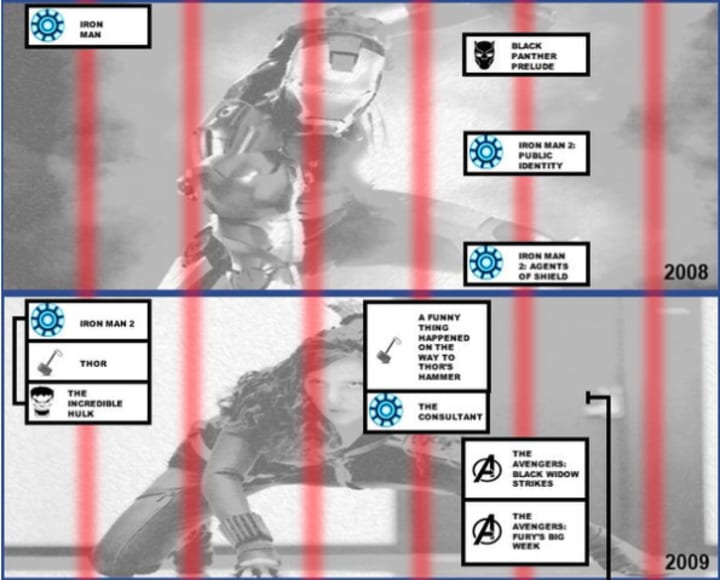
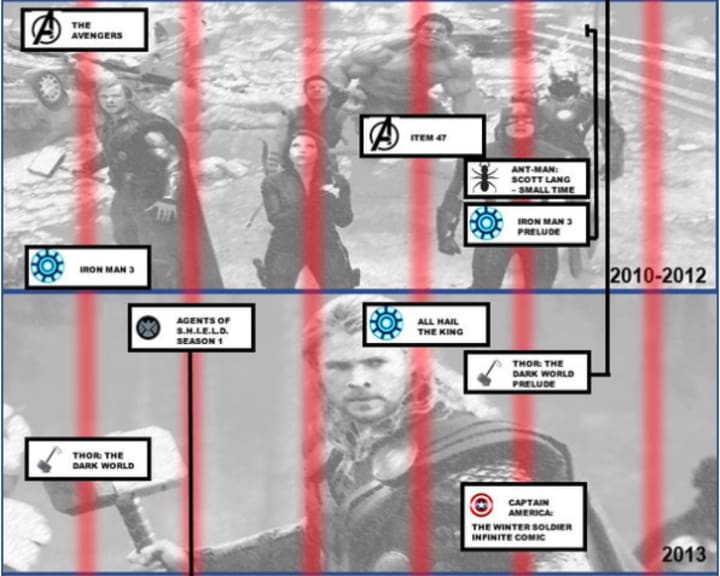
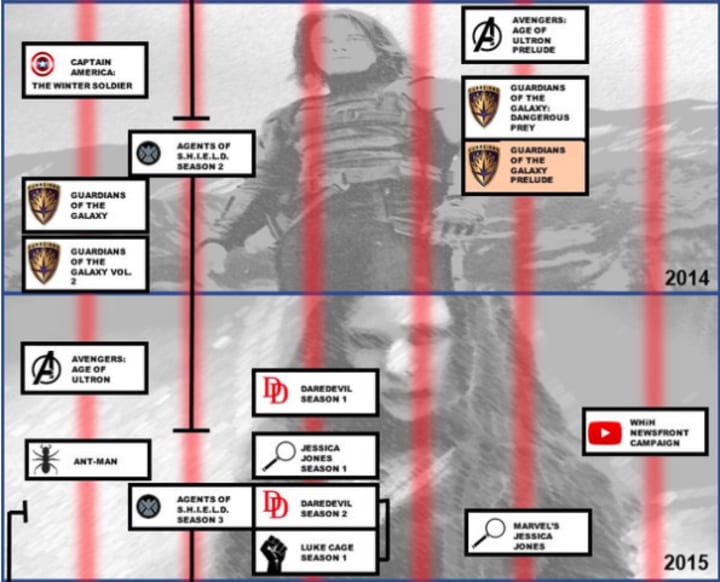
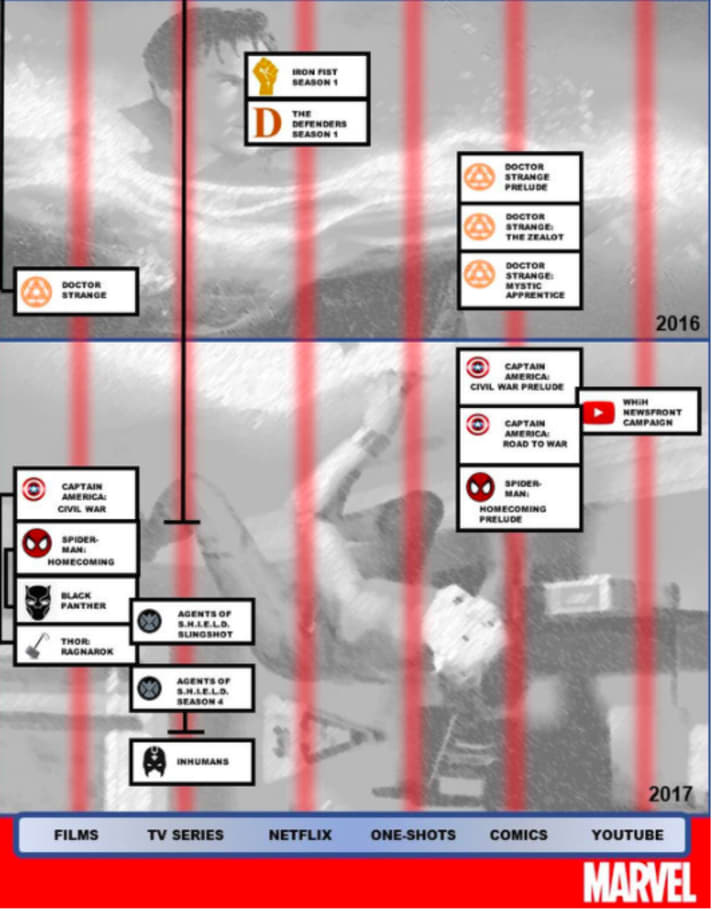
Let's run through the timeline in detail!
The Second World War To The Present Day
- Key Superhero Events: Steve Rogers becomes Captain America, and defeats the Red Skull. Agent Carter proves her skills, and ultimately becomes central to founding S.H.I.E.L.D.. Into the 1990s, Captain Marvel battles the Skrulls.
The timeline kicks off with Captain America: The First Avenger. Although that film was released in 2011, it's mostly during World War II. The tie-in comic book Captain America: First Vengeance is set in April 1944, during the war between the SSR and Hydra, and uses flashbacks to help us connect more deeply with the characters. The end-credits sequence for The First Avenger shows Steve Rogers awakening in the present day.
We've visited the period between World War II and the present day in a number of flashbacks, as well in the sadly canceled Agent Carter series. Although the show was intended to set up the founding of S.H.I.E.L.D., the series was sadly cancelled before we got to that point. What's more, with the one-shot specifying only a year passed between the end of the War and the founding of S.H.I.E.L.D., the TV show and the one-shot now directly contradict. It's likely that the one-shot is no longer to be considered canon; I've shaded it out as a result.
The Ant-Man Prelude miniseries is set during the Cold War, before the fall of the Berlin Wall. Hank Pym infiltrates what appears to be a real Hydra base, with brainwashing technology that's clearly similar to that seen decades later in Captain America: The Winter Soldier.
Finally, at #SDCC2017, we learned that Captain Marvel will be set during the 1990s. No definite date has yet been given, but Kevin Feige has insisted that there's a reason for this.
2008 — Tony Stark Becomes Iron Man
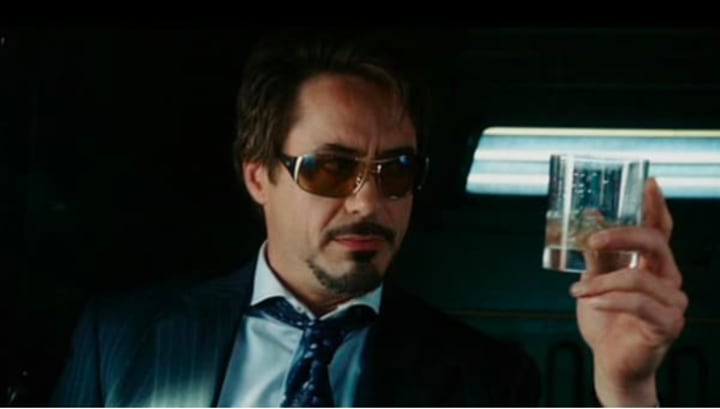
Billionaire, genius, playboy, philanthropist. [Credit: Marvel Studios]
- Key Superhero Events: Tony Stark suits up as Iron Man, and reveals himself to the world
In the buildup to 2017's Captain America: Civil War, Kevin Feige declared that - unless otherwise indicated — every Marvel movie is set in the year of its release. Unfortunately, this principle soon became complicated by Spider-Man: Homecoming, but I'm choosing to fix Iron Man in 2008 because that was clearly Feige's intention. The Black Panther Prelude kicks off within hours of this film, and shows T'Chaka and T'Challa reacting to Tony Stark's revelation that he is Iron Man.
With Iron Man 2 shifting to early 2009 (six months after Tony Stark revealed his identity to the world), the tie-in comics Public Identity and Agents of S.H.I.E.L.D. have to be set within that period; they act as setup for Iron Man 2. The Agents of S.H.I.E.L.D. miniseries was particularly interesting, focusing in on S.H.I.E.L.D. agents Black Widow and Coulson.
2009 — Asgard Arrives
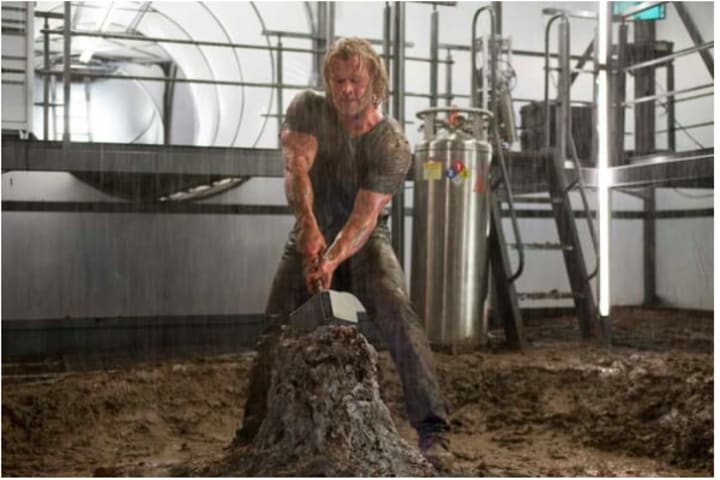
A poignant moment. [Credit: Marvel Studios]
- Key Superhero Events: Stark Industries come under attack; the Hulk battles the Abomination in Harlem; and Thor returns to Earth for the first time in millennia
As you can see, three Marvel movies happen concurrently; Iron Man 2, Thor, and The Incredible Hulk. Iron Man 2 gives us an explicit nod to The Incredible Hulk, with news footage of the Hulk's rampage in Harlem, while a sub-plot sets up Thor. This timeline is reinforced by an official prelude comic, Fury's Big Week.
It's worth noting that this timeline directly contradicts visual cues in Daredevil Season 1, which indicate the Harlem incident happened in 2011. However, we simply have to compress Phase 1 of the MCU in order to make sense of Spider-Man: Homecoming's reference to "eight years ago."
2010 Through To 2012 — Avengers Assemble!
- Key Superhero Events: The Chitauri invasion of New York
The Avengers was previously dated in 2012, with particular references in Agents of S.H.I.E.L.D., but in the wake of Homecoming we have to dismiss that. Unfortunately, that sits awkwardly with Iron Man 3, which is intended to be set in the same year as the Chitauri invasion, but seems to be happening in Christmas 2012. In truth, this is the point where the timeline begins to break down post-Homecoming, and I've deliberately left wriggle-room here as different fans are taking different views.
The Item 47 one-shot happens sometime after The Avengers, and shows just how dangerous Chitauri technology could be. It acts as a proof of concept for Agents of S.H.I.E.L.D., and also sets up sub-plots that are relevant to Spider-Man: Homecoming. Meanwhile, a WHiH news report released in the run-up to Ant-Man dates the tie-in comic Ant-Man - Scott Lang: Small Time, setting it in 2012.
2013 — Coulson Gathers His Team
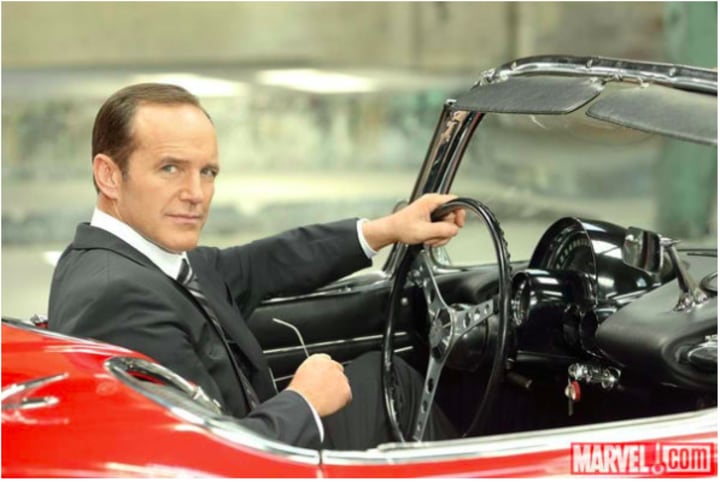
Coulson returns from the dead! [Credit: ABC]
- Key Superhero Events: Phil Coulson gathers his team together; Thor battles Malekith
Until Homecoming, Agents of S.H.I.E.L.D. was the reliable place-setter of the MCU. It ran on in the background, carefully establishing and developing the chronology, helping us understand when every movie happened. Unfortunately, for that precise reason, the show is most affected by Homecoming. In order to make this timeline fit, you have to stretch out the first season. Fortunately, there are gaps in the narrative where you can assume the passage of time. Still, Season 1 has to happen after S.H.I.E.L.D. learns about Extremis technology, and there's a tie-in episode to Thor: The Dark World.
2014 — The Fall Of S.H.I.E.L.D.
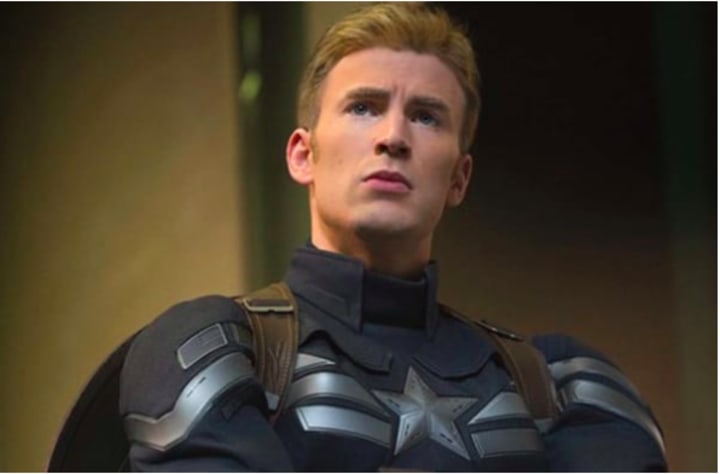
Steve Rogers takes down Hydra and S.H.I.E.L.D. [Credit: Marvel Studios]
- Key Superhero Events: The fall of S.H.I.E.L.D.; the Guardians of the Galaxy assemble to save Xandar from Ronan; Star-Lord meets his father
Captain America: Civil War includes a reference to the Avengers having been without supervision for "four years." While this dialogue was originally intended to refer to the team's founding, we can retcon it as a reference to the fall of S.H.I.E.L.D.; with Fury taken off the scene, the Avengers would no longer report in to anyone, explaining Ross's comments.
#GuardiansOfTheGalaxy has become a subject of real controversy, with the official Guardians of the Galaxy Prelude comic directly contradicting the sequel. James Gunn responded to a fan question on Twitter by simply declaring that it's not canon. Meanwhile, the sequel — #GuardiansOfTheGalaxy2 — is set only a few months after the first film.
2015 — The Sokovia Incident
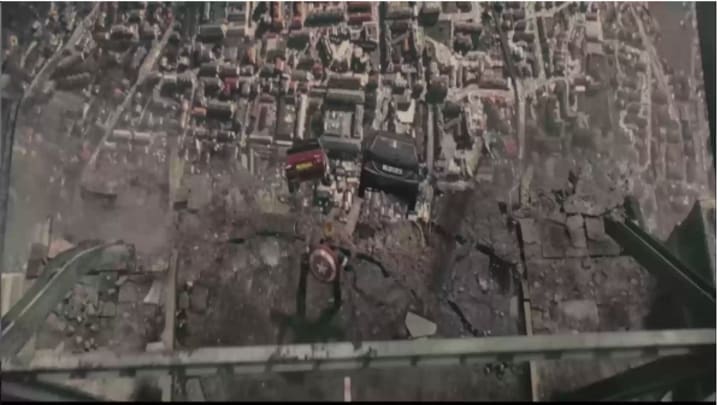
The destruction in Sokovia. [Credit: Marvel Studios]
- Key Superhero Events: Sokovia is ravaged by Ultron; Superheroes emerge on the streets of New York; Scott Lang becomes Ant-Man
One of the most important events in the MCU's history, in 2015 Tony Stark created Ultron. We're now briefly back to the principle that Marvel movies are set in the year of their release, as was likely intended at the time.
The popular Marvel Netflix shows launch in late 2015, and have still actually taken up a few months in time. One advantage of the post-Homecoming timeline is that these series will now have a lot more wriggle-room before they get to the Sokovia Accords, meaning Marvel Television don't need to worry about them overmuch.
Finally, the year closes with Scott Lang suiting up as Ant-Man.
2016 — Stephen Strange Joins the Masters Of The Mystic Arts
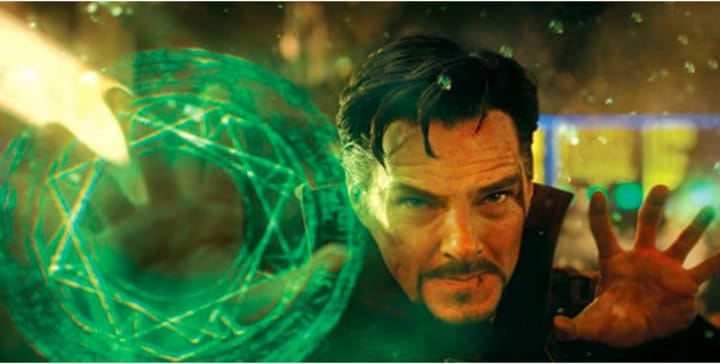
Time is the weapon of Stephen Strange! [Credit: Marvel Studios]
- Key Superhero Events: The Defenders battle the Hand in New York; Stephen Strange becomes a sorcerer
As we'll see in the 2017 section, Homecoming has forced us to strip 2016 of most major superhero events. The exceptions are the Marvel Netflix shows, which currently span a relatively short period of time. The Defenders, for example, has been confirmed to be a couple of months after the events of Daredevil Season 2; that means we can place Iron Fist in early 2016 as well.
#DoctorStrange is probably the most difficult movie to place in the wider MCU continuity, as there's an ambiguous reference that, at first glance, seems to set the film during the events of Iron Man 2. Ultimately, though, interviews and prelude comics have established a 2017 date. I've discussed the continuity of Doctor Strange in detail in another post.
2017 — The Superhero Civil War
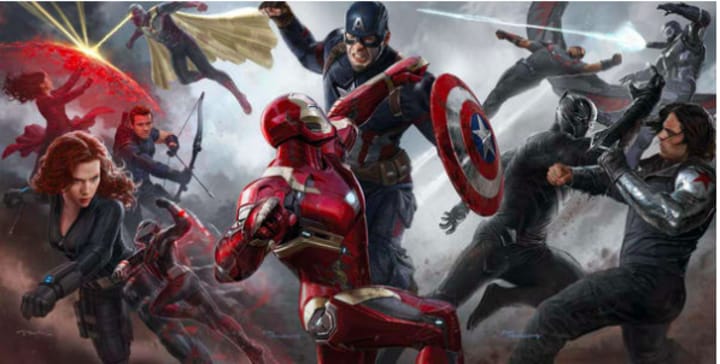
Avengers disassemble! [Credit: Marvel Studios]
- Key Superhero Events: The Sokovia Accords become law, dividing the Avengers; the Black Panther deals with unrest in Wakanda; and Spider-Man takes on the Vulture.
This is where the timeline becomes awkward. Both #SpiderManHomecoming and #BlackPanther are set immediately after the events of Civil War. In the case of Homecoming, it's a deliberate strategy to keep Spider-Man youthful, while for Black Panther, it's a deliberate decision to exploit the political instability caused by the death of King T'Chaka.
Unfortunately, Homecoming dates itself in 2017, meaning Civil War has to jump forward a year. This causes real problems for Agents of S.H.I.E.L.D. Season 3, where it simply has to kick off in 2015 (the episodes are far too specific), but features a tie-in to Civil War. Thankfully, there are potential gaps between episodes, so you can safely stretch it out without doing damage to the narrative flow. Meanwhile, Agents of S.H.I.E.L.D. Season 4 only takes a brief period of time; the whole third pod, for example, only lasts a week.
It's an awkward fit, but it just about works, even if it does essentially result in tie-ins and TV shows having a lower level of canonicity to the movies.That said, this adjusted timeline may well be of use to Marvel Television, as it ensures the Netflix shows aren't going to be impacted by the Sokovia Accords in the short-to-medium term; they're still set in early 2016 right now, and Civil War now doesn't happen until 2017.
It's most likely that Homecoming is in error; I can't see Marvel adjusting continuity to this extent. Still, until Kevin Feige comments on the issue, we actually have no real way of knowing for sure. So we currently have two competing models of the MCU timeline.
The MCU is like nothing else, and only looks set to expand; where Marvel's rival DC has chosen to keep their TV and film universes separate, the MCU spans pretty much every form of media Marvel can get their hands on. With an impressive slate of TV series, and plans in progress for Phase Four, the MCU is only going to get bigger and better!
What's your favorite part of the MCU to date?
(Featured image: RockLou)
About the Creator
Tom Bacon
A prolific writer and film fan, Tom has a deep love of the superhero genre.


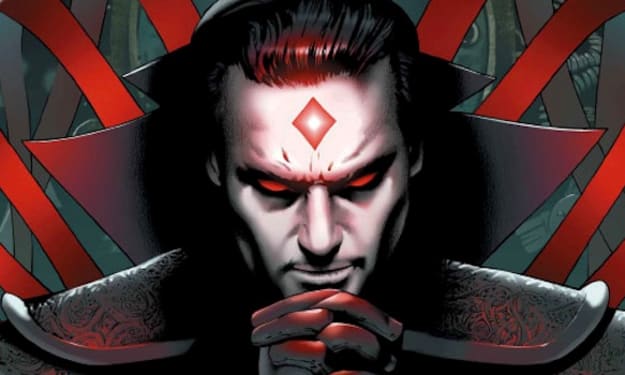



Comments
There are no comments for this story
Be the first to respond and start the conversation.